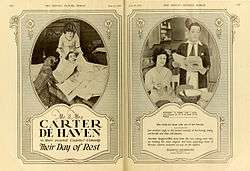Carter DeHaven
Carter DeHaven (born Francis O'Callaghan; October 5, 1886 – July 20, 1977) was an American movie and stage actor, movie director, and writer.
Carter DeHaven | |
|---|---|
.jpg) | |
| Born | Francis O'Callaghan October 5, 1886 Chicago, Illinois, U.S. |
| Died | July 20, 1977 (aged 90) Los Angeles, California, U.S. |
| Resting place | Forest Lawn Memorial Park Cemetery, Glendale, California, U.S. |
| Occupation | Actor, director and writer |
| Years active | 1903–1965 |
| Spouse(s) | Evelyn Burd
( m. 1929; div. 1940) |
| Children | 2, including Gloria DeHaven |
Career
DeHaven started his career in vaudeville in 1896[1] and started acting in movies in 1915. He regularly starred in comedy shorts up until 1923. He worked for Paramount in 1920, and some of his films were directed by Charley Chase.
A 1923 short Character Studies uses editing as DeHaven "transforms" himself into the spitting image of various major film stars of the era: Buster Keaton, Harold Lloyd, Douglas Fairbanks, Roscoe 'Fatty' Arbuckle and 13-year-old Jackie Coogan. This was the only film in which Keaton and Lloyd appeared together and also marked Keaton's last film appearance with Arbuckle, his former partner.
DeHaven went on to work with Charlie Chaplin as assistant director on Modern Times (1936) and assistant producer for The Great Dictator (1940). In the latter film, he also played the Bacterian Ambassador. In the 1959–60 season, he appeared four times in various roles, and his daughter Gloria once as Rosemary Blaker, in the episode "Love Affair" on the television series Johnny Ringo. At this time he also guest-starred on The Donna Reed Show in the role of Fred Miller in "It Only Hurts When I Laugh".
In 1965, DeHaven played an old man walking with his wife in a park in the Bewitched episode "Eye of the Beholder".[2]
Personal life and death
He was married to actress Flora Parker. They would often be paired together in films, including The College Orphan (1915) and Twin Beds (1920). Their daughter, actress Gloria DeHaven, made her first screen appearance in Modern Times. Both Carter and Gloria DeHaven have their own stars on the Hollywood Walk of Fame. After their divorce, Carter DeHaven married Evelyn Burd (a union which also ended in divorce), and they had a son, Carter DeHaven Jr., also an actor and director.
Carter DeHaven died in 1977 at age 90 and was interred at Forest Lawn Memorial Park Cemetery, Glendale, California, U.S.
Filmography

| Year | Title | Role | Notes |
|---|---|---|---|
| 1915 | The College Orphan | Jack Bennett, Jr. | |
| 1916 | The Wrong Door | Philip Borden | |
| 1916 | A Youth of Fortune | Willie O'Donovan | |
| 1916 | From Broadway to a Throne | Jimmie | |
| 1916 | Timothy Dobbs, That's Me | Timothy Dobbs | |
| 1916 | He Becomes a Cop | Short | |
| 1916 | Get the Boy | ||
| 1919 | Their Day of Rest | Short | |
| 1920 | Am I Dreaming? | ||
| 1920 | Twin Beds | Signor Monti | |
| 1921 | The Girl in the Taxi | Bertie Stewart | |
| 1921 | My Lady Friends | James Smith | |
| 1921 | Marry the Poor Girl | Jack Tanner | |
| 1925 | The Thoroughbred | Archie de Rennsaler | |
| 1940 | The Great Dictator | Bacterian Ambassador | |
| 1962 | The Notorious Landlady | Old Man | Uncredited |
References
| Wikimedia Commons has media related to Carter DeHaven. |
- Cullen, Frank; Hackman, Florence; McNeilly, Donald (2007). Vaudeville old & new: an encyclopedia of variety performances in America. Psychology Press. pp. 303–304. ISBN 978-0-415-93853-2. Retrieved February 16, 2020.
- End sequence of Bewitched episode, including credits on YouTube; accessed February 27, 2010.
External links
- Carter DeHaven on IMDb
- Carter DeHaven and Flora DeHaven portrait